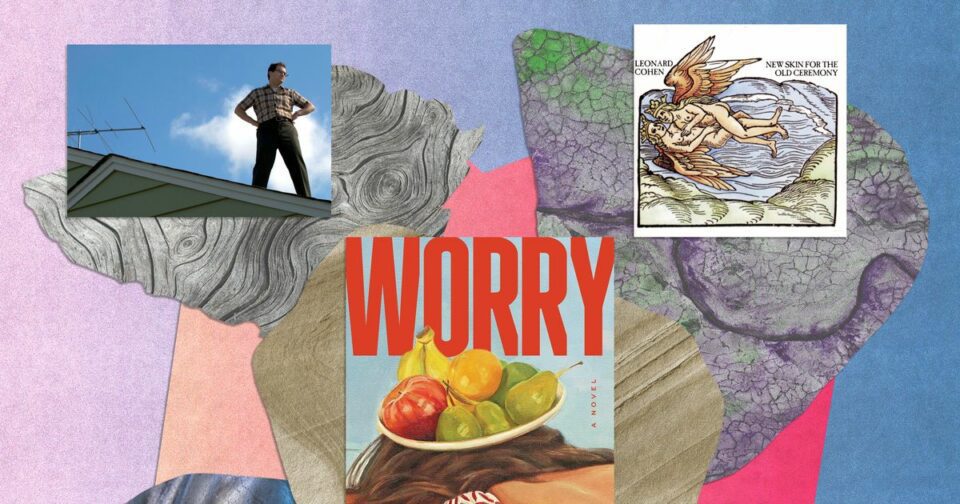
Justice for the doomscroll? Alexandra Tanner’s debut novel, Worry, personifies the cultural desensitization to violence that comes from our daily social-media cocktails in its always-worried narrator, Jules. “That unconscious monologue that we have, not just when we’re scrolling but throughout all of life, is something I was super interested in trying to capture,” says Tanner. “I think it’s an anxious book that I hope people will find ironic because of how it gives space for the texture of neurotic thought.”
It started, of course, with Tanner’s own doomscrolling — she was served the occasional mommy blogger and followed one or two of them out of morbid curiosity. Her feed quickly filled with right-wing influencer moms pushing conspiracy theories and essential oils. At first, she was consuming the content to try and understand something larger, but it didn’t pan out that way. “There’s nothing to discuss, or there’s nothing to intellectualize; it’s just a black hole,” says Tanner. Instead, the habit made its way into Jules, who spends much of the book obsessively following “mommies” while slowly realizing her own mother is becoming one.
Part domestic novel, part internet observation, this book is not only about mother-daughter relationships. The star of the show is really the strange intimacy between siblings. Jules’s sister, Poppy, moves into her cramped apartment for five months. Tanner was inspired by her experience living with her sibling in a studio apartment for five months, too. She describes the perspective of Jules, and therefore the book, as “caustic” and “jaundiced,” adding, “I wanted readers to feel trapped in a perspective that’s so dark to the point of being comical, but also that does reveal what living with anxiety can do to a person and their experience being in the world.”
As vividly and unrelentingly dark as the world of Worry is, its storytelling style is genuinely funny; Tanner also inserts absurd details and scenarios that will make you laugh despite the narrator’s sour perspective. Below, the author spoke to the Cut about the work that helped her along and gave her permission to write a likable novel about deeply unlikable things.
Eurydice, by Sarah Ruhl
People have been picking up on a symbol in my book that references a Greek tragedy. There’s a playwright whose name is Sarah Ruhl. She made me want to be a writer, and she has an adaptation of Eurydice that I saw performed as an opera a few years ago. There’s this beautiful moment where Eurydice is in the underworld, and her father’s there, and she’s like, “Where do I check into my room here?” Of course, there’s no room for her, and he builds her a room made out of string.
Her work as a whole is about domesticity, care, and characters having these big interior experiences that become kind of metaphorized through the magic of what you can do on a stage. I was thinking about these big, emotional moments.
How Should a Person Be?, by Sheila Heti
I like Sheila Heti’s work and the way she pulls from life and uses real conversations and creates all these different versions of herself and her friends. Reading How Should a Person Be? in 2014 was a huge experience for me. It was probably the first autofictive book that I read. I feel like the theme here is work I found that gave me permission to do something that I was scared to do. The way she transcribed life so closely, that was something I really wanted to replicate here, in terms of taking conversations with my friends or with my sibling, or little experiences I had day-to-day, and finding a way to make them compelling and burrow into them a little bit.
A Serious Man, directed by Ethan and Joel Coen
A Serious Man is kind of a Book of Job adaptation. There’s some funny stuff going on in the book with Jules feeling like having to carry groceries home from the store is this biblical struggle for her. A Serious Man is my favorite movie. It’s a Coen brothers movie, so it’s really funny, but really dark and kind of mystical. It opens in the late 1800s, in Eastern Europe, in a shtetl. There’s this scary ghost story that isn’t really connected to the main narrative in a way that’s obvious at first. But it’s these questions of fate and what it is to be Jewish. The main narrative is in the 1960s in Minnesota. My understanding is that it’s the Coen brothers’ most autobiographical movie, that it’s a lot about their childhood and these little funny moments of difference between them and the world around the characters at the heart of the movie. It’s about a professor, Larry, who teaches physics and is posing these big questions, like Schrödinger’s cat, to his students, but not really understanding them himself.
The repeated refrain throughout the movie is What’s going on? Larry says it so many times. He walks into a room and he’s like, “Why is this happening? Why do I feel out of the loop about what’s happening in my own family, what’s happening in my own community? Why can’t I understand why I’m getting divorced and why my daughter needs to wash her hair five times a day?” Just this sense of being oppressed by every little thing in daily life, that I think is the big one-to-one there. And it also has a really miserable ending.
New Skin for the Old Ceremony, by Leonard Cohen
What is there to say? I mean, his music is dark, sexy, scary, and really Jewish. I just like having him around while I’m working. There’s some mythmaking. It’s nice to be sitting and reading, listening to Leonard Cohen, because the music is beautiful, but then it’s also nice to sit and think about what he’s saying and meditate on it.
New Skin for the Old Ceremony is the most artistic title he has. His albums are all titled, like, Songs of Leonard Cohen, New Songs, More New Songs. They’re not very gestural, but that one is.
Curb Your Enthusiasm
I watched a lot of Curb and a lot of Seinfeld while I was writing the book to get that sense of how to make a narrative joke pay off in a funny, unexpected way. My book is actually set in the Brooklyn Jewish Hospital, which is where Larry David was born. It’s this amazing coincidence that I only learned about a few weeks ago. The book is interested in how these little nothing moments are transformed into these huge running bits and they influence the characters’ romantic decisions, and they influence their friendships. I think Curb and Seinfeld share that.
More From This Series
- Jezz Chung Wants You to Change
- Jessica J. Lee Will Make You Stop and Smell the Weeds
Katja Vujić , 2024-05-13 19:43:26
Source link


